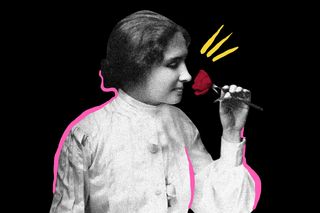
Why Scents Evoke Such Strong Memories
The brain’s smell and memory centers are wired together in a way no other senses are.

When I first arrived in Mumbai a decade ago, everyone expected me to be overwhelmed — by the sight of so many people and vehicles, by the horns honking and whistles blowing, by the taste of chili in my food. None of these things bothered me, though. What I couldn’t get over, however, was the smell — of hand soap. It wasn’t right. It didn’t smell clean. It smelled like random chemicals, but none of them recognizable — none I would want to rinse my hands in.
On the other hand, a certain brand of hand soap in the U.S. had the potential to immediately transport me back to my grandmother’s blue-tinted bathroom of 20 years ago, my grandfather’s old-fashioned shaving equipment standing to the left of the mirror, a scratchy, faded terry cloth towel in my hand.
Scents have long been known to evoke strong reactions and memories to a degree of vividness and viscerality that other senses do not. But how?
The brain wiring behind our sense of smell is tangled up in our brain wiring for memory and emotion in a way none of our other senses are. For all other senses, the stimuli first trigger the brain’s thalamus, which acts as a coordinator, kicking into gear other parts of the brain that might be needed to interpret the sensory information. By contrast, the first part of the brain scent stimulates is the smell, or olfactory, center before heading directly to the amygdala (related to emotion) and hippocampus (related to memory), reaching both in a “synapse or two,” John McGann, Ph.D., an associate professor in the psychology department of Rutgers University, U.S., tells LiveScience. Scent stimuli bypass the thalamus entirely.
Once upon a time, all human senses connected directly to the brain’s emotion and memory centers, but evolution reorganized the wiring for all except smell.
“During evolution, humans experienced a profound expansion of the neocortex that re-organized access to memory networks,” Christina Zelano, Ph.D., an assistant professor of neurology at Northwestern University’s Feinberg School of Medicine and lead author of a recent study into the neurobiology of scent memories, said in a statement. “Vision, hearing, and touch all re-routed in the brain as the neocortex expanded, connecting with the hippocampus through an intermediary … rather than directly. Our data suggests olfaction did not undergo this re-routing, and instead retained direct access to the hippocampus.”
In this way, scent usually provokes an emotion first, and memory second — both of which might be strong, or the emotion might be felt more strongly than the memory. This is because emotions used to act as humans’ guides to the world — if something makes you feel scared, stay away; if something makes you feel happy, it’s probably safe to approach.
Related on The Swaddle:
More Than 5% of the World Lives With Anosmia, or No Sense of Smell
Because of this tie with emotion, scents “can bring back memories that might otherwise never be recalled,” Dr. Rachel Herz, a professor at Brown University and the leader of one of the earliest studies on this topic, has explained. But that doesn’t mean these recollections are any more accurate — though the strength of our feelings might make us believe they are.
Additionally, context is important — if the context is different from the original experience of a scent, you’ll be more likely to have an emotional response, but less likely to have a distinct memory. Most of such scent-evoked memories are thought to originate during childhood, when we’re experiencing so many scents and odors for the first time.
Understanding how scent and memory relate can help us understand our own recollections and experiences better. But it also takes on new, wider importance amid a global pandemic that is leaving a lot of people without a sense of smell. The loss of smell can profoundly reduce an individual’s quality of life, Zelano says, and often correlates with depression.
“Smells are a profound part of memory, and odors connect us to especially important memories in our lives, often connected to loved ones. The smell of fresh chopped parsley may evoke a grandmother’s cooking, or a whiff of a cigar may evoke a grandfather’s presence. Odors connect us to important memories that transport us back to the presence of those people,” Zelano says.
In other words, after a year during which much of what makes us who we are was stripped bare, scent helps us remember not only where we come from — but also who we are.
Liesl Goecker is The Swaddle's managing editor.
Related


1 in 4 Women Have Been Assaulted by a Partner: WHO
